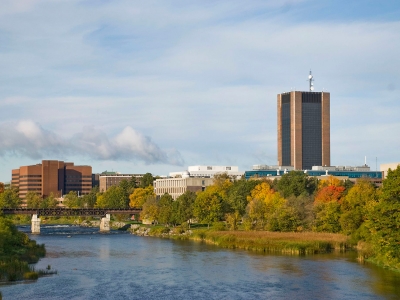Carleton University’s Steven Cooke, professor and Canada Research Chair in the Department of Biology and the Institute of Environmental Science, along with six colleagues from Carleton, including Jesse Vermaire and Joe Bennett, the University of Ottawa and the University of Sherbrooke, have been awarded an NSERC Strategic Partnership worth $649,000 over three years to support managing Parks Canada’s historic Rideau and Trent-Severn waterways to maintain and enhance ecosystem services.
“With the Rideau Canal being adjacent to campus, this project will provide many opportunities for undergraduates and graduate students to engage in real research,” said Cooke. “This project is all about partnerships — we will be working with cottager associations, anglers, boaters, other stakeholders and all levels of government to ensure the health of the Rideau Canal and Trent-Severn Waterways.”
Parks Canada is investing roughly a billion dollars to upgrade infrastructure at numerous locations along the historic waterways over the next decade, providing an opportunity to modernize infrastructure and help improve the health of these aquatic ecosystems. Research will inform operational changes of locks and dams and policies, providing benefits to fish, and to species at risk, decreasing shoreline erosion, enhancing recreational use and providing benefits to surrounding communities.
“Carleton continues to take the lead working with diverse partners on local issues,” said Rafik Goubran, vice president (Research and International). “This collaborative project will play a vital role informing policy development and ensuring the ongoing health of local communities and the environment.”
Cooke, in partnership with Parks Canada, the Rideau Valley Conservation Authority and Big Rideau Lake Association, will generate knowledge to help maximize ecosystem services in the face of stressors caused by humans. Cooke will combine natural science, engineering and social science research to:
- Determine the influence of dam and lock station presence and operations on abiotic (i.e., water, sediment) and biotic (i.e., recreational fish, at-risk fish and turtles) connectivity;
- Identify effects of shoreline habitat and aquatic management strategies on ecosystem structure; and
- Investigate the perspectives of key stakeholders related to waterway management scenarios and communication strategies.
Beyond these core objectives, Cooke will share his findings with his partners and stakeholders and train students in an integrated, multi-disciplinary framework. The proposed research will help safeguard the social, cultural and ecological values of these nationally significant waterways by providing Parks Canada with the environmental and social science evidence needed to inform policy development and management.
Media Contact
Steven Reid
Media Relations Officer
Carleton University
613-520-2600, ext. 8718
613-265-6613
Follow us on Twitter: www.twitter.com/Cunewsroom
Need an expert? Go to: www.carleton.ca/newsroom/experts
Friday, August 10, 2018 in News Releases
Share: Twitter, Facebook



